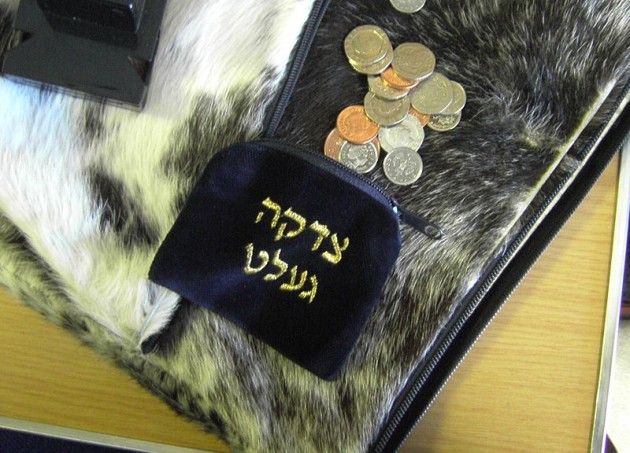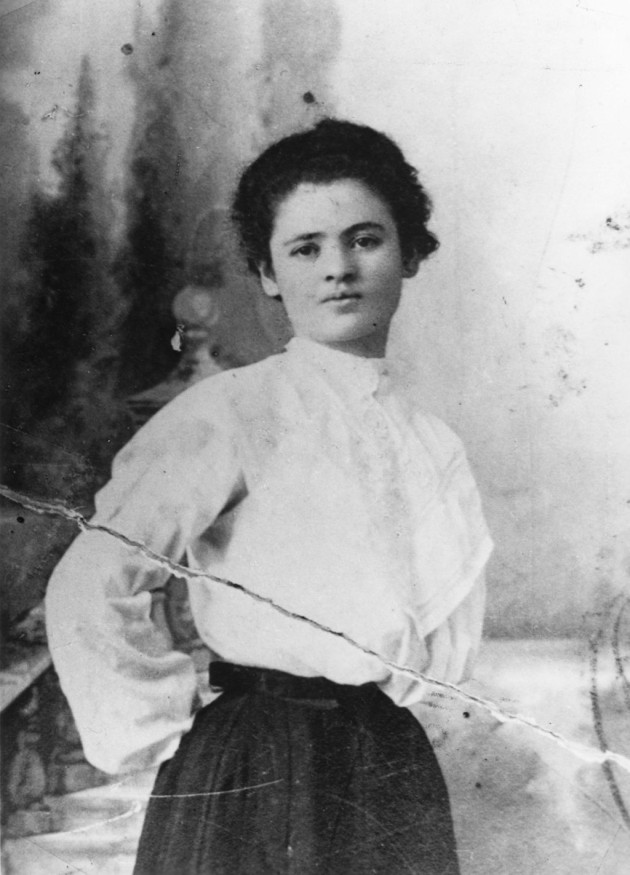
by Mindy Isser
Why We Need to Teach Tzedek, Not Just Tzedekah

Tzedekah pouch. Photo credit: Cheskel Dovid.
Growing up, I spent a lot of time in my Conservative synagogue—my parents prioritized Jewish learning, and so I spent two afternoons and one morning a week in Hebrew school. Nothing about adolescence has shaped me as much as those classes, where I learned an incredible amount about Judaism, the limits of liberalism, and myself.
My biggest learning memory—outside of beginning to understand the depths of horror of the Holocaust—is around tzedakah, charity. We often did our morally obligated good deeds together as a class: volunteered at homeless shelters, delivered groceries to senior citizens, and put quarters in the tzedakah box (which is a lot when you’re in middle school!) We would talk about how we felt afterward—nervous and guilty, yet righteous—and how important it is to “give back,” both because God commands it and also just because it’s the “right thing to do.”
But many things are the “right thing to do,” including fighting for unions in the workplace, for a world without refugees, and for an economic and political system that works for all of us. Although there was intense focus on tzedakah, I don’t remember learning about tzedek, the root word of tzedekah—justice, the lifeblood of Jewish history and resistance. I never learned why people were homeless, hungry, or poor—I just knew we had to help them. Teaching children to give back to their community, especially people less fortunate than they are, is a net positive. It’s a no-brainer: be kind to other people, yes, of course.
But if we don’t teach them about the structures that create homelessness and poverty, we’re doing a disservice to our children, our community, and Judaism. Ultimately, it does nothing to actually repair the world—tikkun olam, another important Jewish value—and it ignores our deep and profound history of our struggle for justice.
I had to learn all of that on my own, or at least, outside of the walls of my synagogue. I ultimately became politicized because of the alienation I felt around my education, both secular and Jewish. My classmates and I were told to do things, told they were important, but when we asked why things were the way they were, we were met with blank stares. I of course don’t blame my teachers who didn’t have the answers, but the lack of connection to our justice-based history is a failure of American Jewry.
When I began to understand the labor movement, I was shocked to learn that the majority of members of the International Ladies’ Garment Workers’ Union (ILGWU) were Jewish women, who were Bundists in Russia. I was lucky enough to learn about Bundism from my bubby, whose parents were communists in Kiev, but I wish I had learned more during my many hours of Hebrew school.

Clara Lemlich was a communist organizer who led a strike of 20,000 workers.
How many young Jewish women would be proud to follow in the footsteps of Clara Lemlich, a communist union organizer who led a strike of 20,000 garment workers? I think many, but we don’t give them the chance. Because of my lack of knowledge, I felt completely bored and checked out of my Jewish education. Until we weave our history of political struggle into our teachings—and give children a true Jewish education—we will continue to lose the interest and commitment of kids like me.
As a union organizer, I feel immense and almost unspeakable pride to come from a line of Jewish women organizers—women like Rose Schneiderman who coined the famous phrase, “bread and roses.” These women workers have paved the way for me to implement tzedek in my own life by working with fast food workers who are fighting for $15/hour and respect at work, and higher ed workers who are standing up to have a voice in the university system. Believing that all workers deserve not just fair wages—but dignity throughout every aspect of their lives—helps me feel closer to God and Jewish teachings. It feels like my personal obligation—from what I’ve come to understand about Judaism—to do this work.
There’s a reason so many Jews were at the forefront of justice struggles both in this country and around the world. It’s in our history, from Vashti, Esther, and Mordechai to rabbis doing civil disobedience to protect sanctuary cities and undocumented immigrants. Right now, there’s too much at stake to stay quiet. With fascism in the White House, and anti-Semitism on the rise, we owe our community this education. We can no longer just “do good” while also ignoring our necessary commitments to making this world a better, more fair place for all of us. If we really value Judaism, we need to arm our children with the knowledge of our past and our obligation to the future, and continue on the path towards justice.
The views and opinions expressed in this article are the author’s own and do not necessarily reflect those of Lilith Magazine.